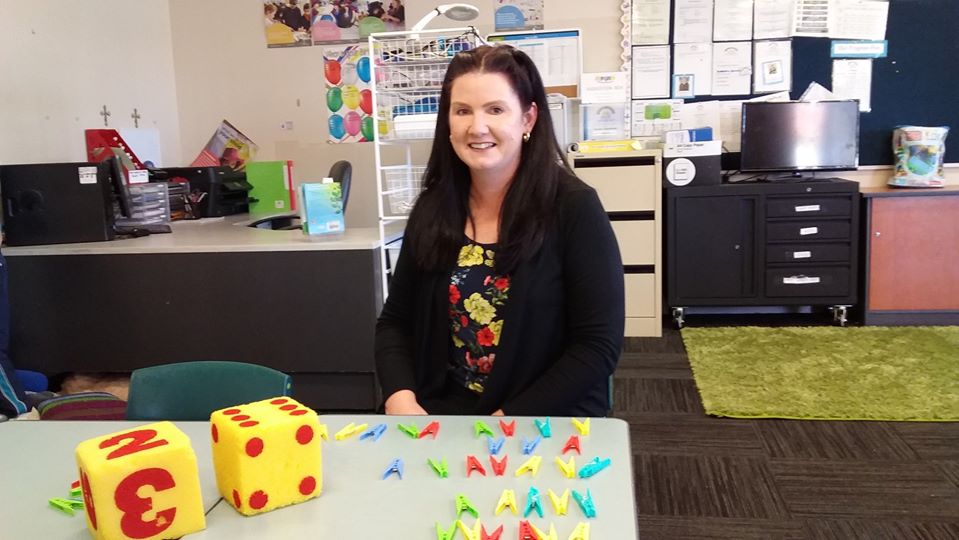
Learning Support Officers mainly support students with disabilities but can also work in mainstream classes.
Learning support officers work in schools to assist the teacher with the implementation of learning programs, particularly for students with disabilities and disorders. This includes supporting students' learning and development, their behaviour, communication skills, and maximising children's access to educational and other experiences. The course to become an LSO is either of the school-based education support qualifications.
According to the NSW government, learning support officers '...provide assistance to students with disability and additional learning and support needs...'.
The term 'Learning Support Officer' or LSOs for short, is the official title for school staff in NSW who perform these duties. Most people who don't work in education simply use the term teacher aide or teacher assistant.
To become a learning support officer in NSW you will first need to complete a nationally recognised LSO course such as the:

Learning Support Officers mainly support students with disabilities but can also work in mainstream classes.
In this article, we answer many of the common questions that we get about LSOs including courses for LSOs in NSW, how to become an LSO in NSW, the roles and responsibilities of LSOs and many others.
LSOs help children with disabilties to access educational and other experiences that they otherwise may have missed out on.
An LSO, or a learning support officer, is quite simply a teacher assistant or teacher aide. They are also called integration aides in Victoria, education assistants (EAs) in WA, and school support officers (SSOs) in South Australia.
As the job title suggests, learning support officers assist and support students with their learning. LSOs help children with disabilties to access educational and other experiences that they otherwise may have missed out on. They are most often deployed by schools to support students who have been diagnosed with a disability or disorder, but not always. Many work with students with autism, ADHD and intellectual disability.
What do we mean when we say 'assist and support students'? It really depends on the teacher, the subject and the needs of the student.
For some situations, the LSO will spend half of their time monitoring their focus student from a distance - allowing them space to interact with their friends. In other instances, the student needs one-on-one support for most or all of a lesson.
LSOs also assist with non-instructional tasks as well. This can include making resources, setting up activities and even purchasing resources from local suppliers. Learning support officers are also all-rounders who help out in the classroom in any way that they are needed. Students learn how to do all of these things in their nationally recognised LSO course with ITAC.

Learning Support Officers work in schools to support learning, development and behaviour.
When you apply for a position, the job description form and other details provided by the school shold give you a good indication of what is expected. For example, an LSO might work one-on-one with a particular student for most of the day or they may circulate and help dozens of students each lesson. Some LSOs work in specialised programs such as those that cater for students who are falling behind academically.
Defining exactly what LSOs do is challenging because they take on so many different roles and responsibilities. Luckily for us, a number of studies have looked into this:
One study from 2018 investigated the effectiveness of LSOs and found that they work closely with teachers in a team environment.
Other studies such as this one in 2016 focuses on the work of LSOs in early years' literacy and numeracy programs. They actually found that children performed better when they had an LSO in the room.
A Victorian study said that LSOs spend a lot of time helping students to integrate into the class which they did in various ways such as by making adjustements to resources and curriculum.
The most common pathway to becoming a learning support officer is to complete a nationally recognised LSO course. There are two nationally recognised qualifications to choose from: the CHC30221 Certificate III in School Based Education Support and the CHC40221 Certificate IV in School Based Education Support.
ITAC's Teacher Aide Combo is also very popular. These qualifications have now become the industry standard for all LSOs employed in a New South Wales School. Enrolling in a reputable course that teaches research-based techniques is also vital - without learning these techniques, you will have significant gaps in your knowledge which may make finding work more challenging.
The most common pathway to becoming a learning support officer is to complete a nationally recognised LSO course.
To become an LSO, you will also need to develop your resume and work in several schools until a position becomes available. Most schools in NSW will not hire an LSO unless they have worked in the school at some point. Schools like to hire people who they know and who have proven that they can do the job adequately.
Before reading any further, we recommend reading this free article: How to become a teacher aide, or this article: Teacher Aide Certificates and Qualifications.
There are a number of different types of learning support officers in NSW as we have touched on earlier in this article. The majority of learning support officers work with students with special needs – autism (ASD), attention deficit hyperactivity disorder, intellectual disablity, fetal alcohol spectrum disorders (FASD), down syndrome, dyslexia, developmental delay, and a range of other physical, neurological and learning disorders.
LSOs often work in schools that are specifically designed for students who with disabilities or disorders. These schools go by various names including special needs schools, special schools and more recently, Schools for Specific Purposes (SSP). These schools are wholly and solely devoted to supporting students with special needs.
Quite often, students in these schools have high support needs. This means that they could not otherwise access learning activities, socialise or complete activities of daily living (ADLs) without some degree of assistance. Special needs schools also have a range of specialist materials, support services, resources and technologies.
Many LSOs in NSW work in mainstream classes which have one or two students who need the support of an LSO. These are known as integrated or inclusive classes. LSOs can also work in specialised programs such as those for Indigenous students, migrants or other disadvantaged cohorts. They may work in regional and rural areas, in high schools or primary schools, and might not even work in a classroom per se e.g. a home economics assistant.

An ITAC student on the last day of placement for her LSO course. Could this be you?
Generally speaking, we advise students to complete the highest-level learning support officer course that they feel capable of completing. For most, this will mean the CHC40221 Certificate IV in School Based Education Support.
This course is considered the qualification for students who wish to work with students with disabilities and disorders, whether in a mainstream or special schools. This course is more than achievable for native or near-native speakers of English, and is especially easy for those who have experience with children (including raising their own).
Completing this LSO course will also give you an advantage in the job market as many training providers only offer the lower-level CHC30221 Certificate III in School Based Education Support.
Schools really like the fact that staff hold both qualifications because it indicates a higher level of understanding and professionalism.
Our recommendation however, is the Teacher Aide Combo. This program is very popular due to the fact that it enables students to complete both the CHC30221 Certificate III in School Based Education Support and the CHC40221 Certificate IV in School Based Education Support in one streamlined, time-saving and cost-effective program. Schools really like the fact that staff hold both qualifications because it indicates a higher level of understanding and professionalism.
Whichever course or provider you choose, be sure to enrol in an integrated course which you can read about here.
Please check our website for current information regarding the cost of our LSO courses. We always like to remind students to consider the fact that the cost of your course is only a small portion of the total cost of your studies. For instance, be careful that you don’t sign up for a course that has ongoing costs such as additional textbook costs, unit by unit fees, administration fees, placement fees, etc.
A cheaper course that takes twice as long, is not really a cheaper course if you miss out on months of paid work.
Also check that the training provider visits you placement and that they offer weekly webinars (if not enrolling class-based). Also ensure that the course is designed 'holistically' meaning all units are mashed together (as opposed to studied one unit at a time as this doubles the time it takes to complete a course). A cheaper course that takes twice as long, is not really a cheaper course if you miss out on months of paid work.
Generally speaking, LSO jobs in NSW are not hard to find provided you have completed a nationally recognised learning support officer course with a reputable provider. You will need a working with children check and a professional resume.
Obviously, we can never guarantee that any of our students will find work, however there are thousands of schools in New South Wales and almost every school has a few dozen LSOs - positions become available all the time. You will also need the right demeanour, and a passion for children's education.
Don't forget to read our article on how to become a teacher aide by clicking here.
We advise our students to broaden their horizons and consider areas that they may not have considered initially (such as high school and special needs schools). You are much more likely to be successful in these schools as many graduates have their sights set on early childhood.
One you hold a nationally recognised LSO qualification, put your name down at 20 or so schools within easy driving range. This is the most common way that our students become contract, full-time or permanent employees - they begin as a relief or casual employee and then pick up long-term contracts when they become available.
While it's certainly possible to walk straight into a permanent position, however schools prefer to get to know people before hiring them - in our experience at least.
We advise our students to broaden their horizons and consider areas that they may not have considered initially (such as high school and special needs schools).
If you have read this far, you're undoubtedly interested in a career as an LSO in NSW. Now might be a good time to see what schools are in your area. You can go to the following for public schools, this site for independent schools and this site for rural schools.
Full-time learning support officers in NSW are paid on average of $1000 per week or around $30 per hour. Full-time for most LSOs in NSW is calculated based on a working week of 32 hours.
You may have seen some sources on the internet calculating LSO salary at around $23 to $28, however we believe this to be incorrect. Why? It's a fact that working with special needs children attracts a higher salary. Another fact - the majority of LSOs work with special needs students - probably 80% or so.
Therefore, most LSOs actually earn more than $30 per hour. The average that some other sites use is the middle point of the whole salary range, but as LSOs mainly sit near the top of that range, the 'average' is not the middle point or even close.
You can learn more about teacher aide pay, allowances, and benefits by reading this article: How much do teacher aides get paid?
As outlined earlier, these two terms have the same meaning. LSO is the official term whereas teacher aide is the term used by the general public.

ITAC student on placement. Learn the skills and knowledge required to effectively contribute to student learning and behaviour by enrolling in a research-based course with ITAC.
Obviously, the answer to this question will depend on who you talk to. Many people however, will tell you that supporting challenging students, such as those with behavioural issues, is probably one of the more stressful parts of their job. This is why it's important to enrol with an experienced and reputable training provider who will equip you with the tools required to manage such situations - not all LSO courses are the same - far from it in fact.
Student in NSW can choose to study a learning support officer course online with ITAC. This includes the CHC30221 Certificate III in School Based Education Support and the CHC40221 Certificate IV in School Based Education Support. Alternatively, many students prefer the Teacher Aide Combo which is unique to ITAC.
Studying online no longer means reading through a never ending pile of PDFs for months on end. Online actually means that you stay in regular contact with you trainer, complete a work placement (which certainly isn’t an online component), attend live webinars, watch pre-recoded lectures (as if you were actually there), and a range of other activities. It certainly doesn't mean going at it alone (although some providers may expect as much).
Studying online no longer means reading through a never ending pile of PDFs for months on end.
Yes. There is a minimum work placement component for the CHC30221 Certificate III in School Based Education Support and the CHC40221 Certificate IV in School Based Education Support of 100 hours.
The work placement is normally completed in a local school and quite often leads to casual/relief or contract opportunities especially if you do well during your time at the school. If you have questions about the work placement, please speak to one of our friendly student advisors or read the information provided on our website under your preferred course.
The enrolment process is very simple: complete the enrolment form on our website by clicking on the ‘Enrol’ tab at the top of this page. Fill in your details and we will be in touch soon. The process takes about 10 minutes.
This article has explored the various aspects of working as a learning support officer or LSO in New South Wales. LSOs are also known as teacher aides or teacher assistants and they are comonly employed to support the educational experiences of students with disabilities and disorders.
To become a learning support officer, you will need to complete a nationally recognised LSO course such as those offered by ITAC. Obtaining work as an LSO is generally easy for graduates from a reputable training provider. The CHC30221 Certificate III in School Based Education Support is the introductory LSO course, while the CHC40221 Certificate IV in School Based Education Support is a higher level qualification.
If you have further questions related to your specific situation or about ITAC's LSO course in NSW, please do not hesitate to contact one of our friendly student advisors.